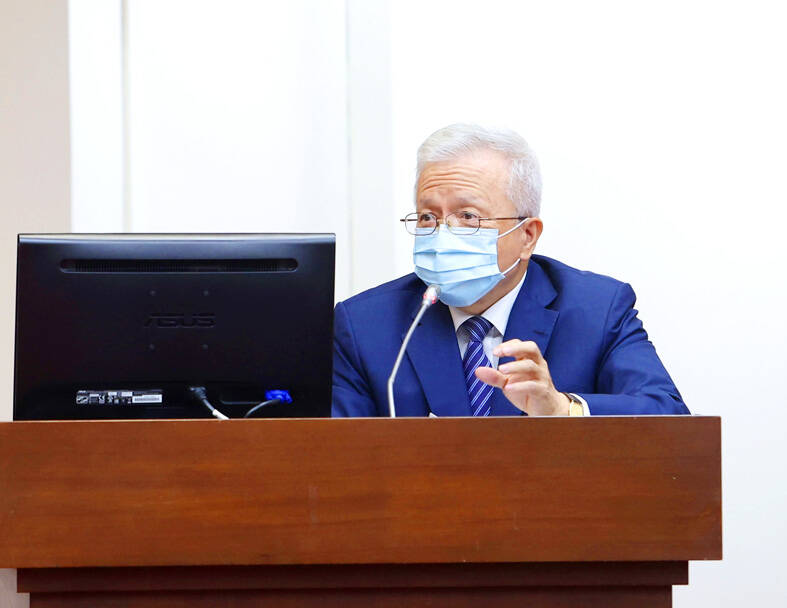The central bank is to focus on inflation in an upcoming quarterly policy meeting, as the public has been affected by rising prices, bank Deputy Governor Yen Tzung-ta (嚴宗大) said at a meeting of the legislature’s Finance Committee in Taipei yesterday.
Yen said the bank considers three factors — economic growth, financial stabilization and inflation — when it adjusts its monetary policy.
Inflation has weighed more in the central bank’s consideration, as the consumer price index (CPI) has risen by more than 2 percent — an alert level set by the central bank — for 19 months in a row, Yen said.

Photo: CNA
Such a long period of high growth in the CPI has boosted public expectation that it is likely to continue to rise, Yen said.
Taiwan’s CPI rose by 2.74 percent over the first two months of this year compared with the same period last year, and by 2.43 percent last month alone, the Directorate-General of Budget, Accounting and Statistics (DGBAS) said.
Inflation could rise further, as the government decided last week to raise electricity rates by an average of 11 percent starting on Saturday next week.
The power tariff hike is expected to result in an increase of 0.204 percentage points to the CPI, the DGBAS said.
The central bank has scheduled its next quarterly policy meeting for Thursday.
Market analysts have said the central bank might leave key interest rates unchanged to boost the economy at a time when Taiwan’s exports have been affected by weakening global demand.
Taiwan’s outbound shipments last month fell 17.1 percent year-on-year to US$31.05 billion, marking the sixth consecutive month of annual decline.
The central bank since March last year has raised rates by 62.5 basis points in an effort to combat inflation.
In the last policy meeting held in December last year, the central bank estimated the nation’s GDP would grow 2.53 percent this year by taking into account Taiwan’s weaker export performance.
Yen said the central bank would announce an update of its forecast after Thursday’s meeting.
Responding to the recent failures of Silicon Valley Bank and Signature Bank in the US, Yen said the US Federal Reserve might slow its pace of hikes in the current rate hike cycle, which is likely to stabilize global financial markets.
The Fed is to begin a two-day policy meeting starting today.

Taiwan Semiconductor Manufacturing Co (TSMC, 台積電) last week recorded an increase in the number of shareholders to the highest in almost eight months, despite its share price falling 3.38 percent from the previous week, Taiwan Stock Exchange data released on Saturday showed. As of Friday, TSMC had 1.88 million shareholders, the most since the week of April 25 and an increase of 31,870 from the previous week, the data showed. The number of shareholders jumped despite a drop of NT$50 (US$1.59), or 3.38 percent, in TSMC’s share price from a week earlier to NT$1,430, as investors took profits from their earlier gains

In a high-security Shenzhen laboratory, Chinese scientists have built what Washington has spent years trying to prevent: a prototype of a machine capable of producing the cutting-edge semiconductor chips that power artificial intelligence (AI), smartphones and weapons central to Western military dominance, Reuters has learned. Completed early this year and undergoing testing, the prototype fills nearly an entire factory floor. It was built by a team of former engineers from Dutch semiconductor giant ASML who reverse-engineered the company’s extreme ultraviolet lithography (EUV) machines, according to two people with knowledge of the project. EUV machines sit at the heart of a technological Cold

CHINA RIVAL: The chips are positioned to compete with Nvidia’s Hopper and Blackwell products and would enable clusters connecting more than 100,000 chips Moore Threads Technology Co (摩爾線程) introduced a new generation of chips aimed at reducing artificial intelligence (AI) developers’ dependence on Nvidia Corp’s hardware, just weeks after pulling off one of the most successful Chinese initial public offerings (IPOs) in years. “These products will significantly enhance world-class computing speed and capabilities that all developers aspire to,” Moore Threads CEO Zhang Jianzhong (張建中), a former Nvidia executive, said on Saturday at a company event in Beijing. “We hope they can meet the needs of more developers in China so that you no longer need to wait for advanced foreign products.” Chinese chipmakers are in

AI TALENT: No financial details were released about the deal, in which top Groq executives, including its CEO, would join Nvidia to help advance the technology Nvidia Corp has agreed to a licensing deal with artificial intelligence (AI) start-up Groq, furthering its investments in companies connected to the AI boom and gaining the right to add a new type of technology to its products. The world’s largest publicly traded company has paid for the right to use Groq’s technology and is to integrate its chip design into future products. Some of the start-up’s executives are leaving to join Nvidia to help with that effort, the companies said. Groq would continue as an independent company with a new chief executive, it said on Wednesday in a post on its Web